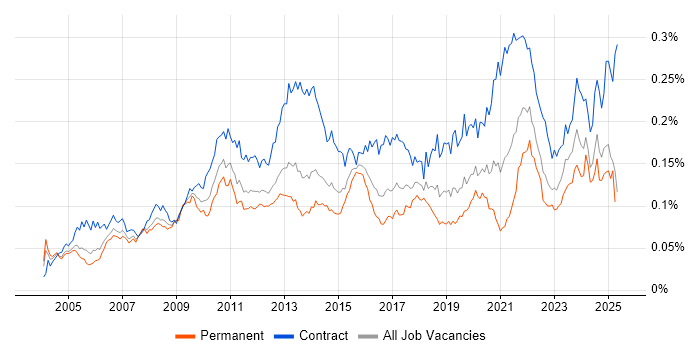Physical Data Model
UK > England
The table below provides summary statistics for permanent job vacancies advertised in England requiring Physical Data Model skills. It includes a benchmarking guide to the annual salaries offered in vacancies that cited Physical Data Model over the 6 months leading up to 22 May 2025, comparing them to the same period in the previous two years.
| 6 months to 22 May 2025 |
Same period 2024 | Same period 2023 | |
|---|---|---|---|
| Rank | 624 | 720 | 836 |
| Rank change year-on-year | +96 | +116 | +63 |
| Permanent jobs citing Physical Data Model | 51 | 115 | 82 |
| As % of all permanent jobs advertised in England | 0.10% | 0.13% | 0.093% |
| As % of the Processes & Methodologies category | 0.11% | 0.16% | 0.098% |
| Number of salaries quoted | 10 | 88 | 63 |
| 10th Percentile | £49,125 | £55,966 | £50,500 |
| 25th Percentile | £61,563 | £64,150 | £58,125 |
| Median annual salary (50th Percentile) | £85,000 | £80,000 | £80,000 |
| Median % change year-on-year | +6.25% | - | +6.67% |
| 75th Percentile | £86,875 | £94,063 | £100,000 |
| 90th Percentile | £93,250 | £105,000 | £107,250 |
| UK median annual salary | £85,000 | £80,000 | £70,000 |
| % change year-on-year | +6.25% | +14.29% | -6.67% |
All Process and Methodology Skills
England
Physical Data Model falls under the Processes and Methodologies category. For comparison with the information above, the following table provides summary statistics for all permanent job vacancies requiring process or methodology skills in England.
| Permanent vacancies with a requirement for process or methodology skills | 45,797 | 73,583 | 84,076 |
| As % of all permanent jobs advertised in England | 94.20% | 85.02% | 95.61% |
| Number of salaries quoted | 22,691 | 53,859 | 49,933 |
| 10th Percentile | £30,000 | £29,000 | £34,324 |
| 25th Percentile | £42,000 | £40,000 | £46,125 |
| Median annual salary (50th Percentile) | £57,500 | £55,000 | £62,500 |
| Median % change year-on-year | +4.55% | -12.00% | +4.17% |
| 75th Percentile | £75,000 | £73,000 | £82,500 |
| 90th Percentile | £98,750 | £93,750 | £102,500 |
| UK median annual salary | £57,500 | £55,000 | £61,000 |
| % change year-on-year | +4.55% | -9.84% | +1.67% |
Physical Data Model
Job Vacancy Trend in England
Job postings citing Physical Data Model as a proportion of all IT jobs advertised in England.

Physical Data Model
Salary Trend in England
3-month moving average salary quoted in jobs citing Physical Data Model in England.
Physical Data Model
Salary Histogram in England
Salary distribution for jobs citing Physical Data Model in England over the 6 months to 22 May 2025.
Physical Data Model
Job Locations in England
The table below looks at the demand and provides a guide to the median salaries quoted in IT jobs citing Physical Data Model within the England region over the 6 months to 22 May 2025. The 'Rank Change' column provides an indication of the change in demand within each location based on the same 6 month period last year.
| Location | Rank Change on Same Period Last Year |
Matching Permanent IT Job Ads |
Median Salary Past 6 Months |
Median Salary % Change on Same Period Last Year |
Live Jobs |
|---|---|---|---|---|---|
| London | +99 | 37 | £65,000 | -27.78% | 35 |
| West Midlands | +66 | 11 | £85,000 | +25.18% | 2 |
| Midlands | +55 | 11 | £85,000 | +25.18% | 2 |
| East of England | +39 | 2 | £90,000 | -18.18% | |
| South West | +99 | 1 | - | - | 2 |
| Physical Data Model UK |
|||||
Physical Data Model
Co-occurring Skills and Capabilities in England by Category
The follow tables expand on the table above by listing co-occurrences grouped by category. The same employment type, locality and period is covered with up to 20 co-occurrences shown in each of the following categories:
|
|
||||||||||||||||||||||||||||||||||||||||||||||||||||||||||||||||||||||||||||||||||||||||||||||||||||||||||||||||||
|
|
||||||||||||||||||||||||||||||||||||||||||||||||||||||||||||||||||||||||||||||||||||||||||||||||||||||||||||||||||
|
|
||||||||||||||||||||||||||||||||||||||||||||||||||||||||||||||||||||||||||||||||||||||||||||||||||||||||||||||||||
|
|
||||||||||||||||||||||||||||||||||||||||||||||||||||||||||||||||||||||||||||||||||||||||||||||||||||||||||||||||||
|
|
||||||||||||||||||||||||||||||||||||||||||||||||||||||||||||||||||||||||||||||||||||||||||||||||||||||||||||||||||
|
|
||||||||||||||||||||||||||||||||||||||||||||||||||||||||||||||||||||||||||||||||||||||||||||||||||||||||||||||||||
|
|
||||||||||||||||||||||||||||||||||||||||||||||||||||||||||||||||||||||||||||||||||||||||||||||||||||||||||||||||||
|
|
||||||||||||||||||||||||||||||||||||||||||||||||||||||||||||||||||||||||||||||||||||||||||||||||||||||||||||||||||
